Almost There: Barbara Stanwyck in "The Lady Eve"
 Wednesday, March 1, 2023 at 8:11PM
Wednesday, March 1, 2023 at 8:11PM 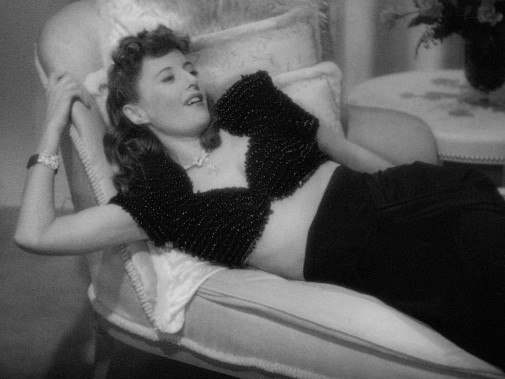
Since its inception, the Academy has shown a certain reluctance to awarding great acting within the comedy genre. It often feels that the sillier the role, the less likely it is to win plaudits for the performer who fleshes it out on screen. That's not to say that comedy is wholly absent from the acting races – it's just rarer, more prone to reductive judgment and dismissal. Considering all this, the recent SAG results feel even more miraculous. They point us toward a scenario where a wild genre riff might win over half of the acting prizes. So with that mind, a comedic episode of "Almost There".
Let's reflect upon an achievement that might be justly named the pinnacle of screen comedy – Barbara Stanwyck's stunning turn in 1941's The Lady Eve…
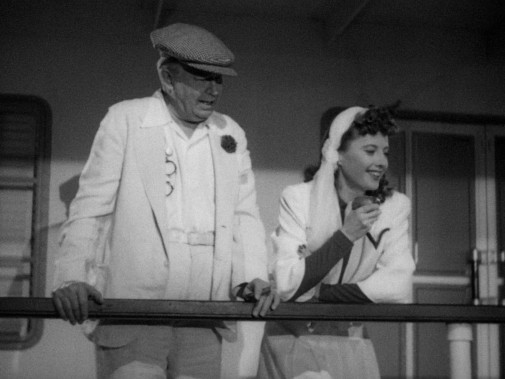
Written and directed by Preston Sturges, based on an original story by Monckton Hoffe, The Lady Eve is an example of peak screwball comedy. It follows a pair of con artists, the father/daughter duo of "Colonel" Harry Harrington and the beautiful Jean. We meet them on an ocean liner, perusing their potential marks with a voracious appetite. She, in particular, exudes a sense of playfulness, a mischievous glint that tempers the greed dripping from every line of dialogue. Watching Henry Fonda's naïve Charles Pike, our heroine is half predator, half imp, with an apple at hand for biblical symbolism and a smile that would feel slimy were it worn by anyone other than Stanwyck.
Because she's as hungry for reckless fun as she is for dimwitted rich men, her opening salvo with this new target is to drop the fruit on his head. It's a perfect introduction, acidity on point, vibrating with the giddy exuberance of a villain about to do their worst. It's clichéd to regard a performance and say it looks like the actor's having fun, but old adages are repeated because they're often true. Tell me Stanwyck isn't having the time of her life as she spies on Fonda through a looking glass, narrating the desperate attempts at seduction by every unmarried woman in Charles' vicinity. There's contempt there, confidence too, but, above all else, there's self-satisfaction.
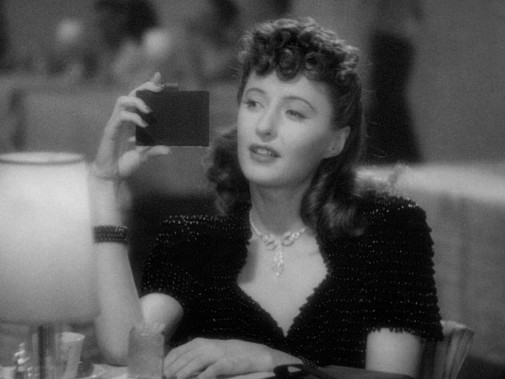
Accustomed to playing shameless fallen women and many a Pre-Code naughty dame, the actress is in her element, navigating Sturges' perfectly structured text like a fish takes to water. Or is she more feline than aquatic? Jean certainly brings a cat to mind, savoring every witticism as if it were cream on her tongue. And oh, how she purrs, vibrating with pleasure whenever her schemes go according to plan. To catch Charles' eye, the vixen orchestrates a trip and broken heel and demands he escorts her to get another pair of slippers up in her room. There, she puts the moves on him, faking disinterest as prelude to more open provocation.
It works so flawlessly that it almost feels mechanical. But of course, Stanwyck's effortless precision makes Jean read human and hotblooded, never robotic, never anything less than engaging. As much as she is seducing the dorky millionaire to be, the star's also seducing the audience, making us part of her con while insinuating the movie's genuine emotions into our collective state of mind. The camera is her proxy for such feats, already smitten with the screen temptress from the first minute she appears. In the ship-bound early passages, the actress feels two breaths away from taking a meta-cinematic leap and winking at her viewers.
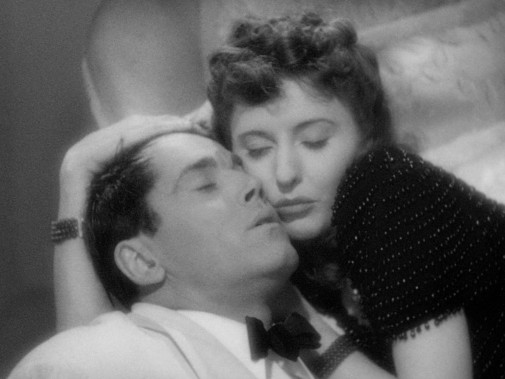
Twenty minutes in, she finds electrifying variation when Jean's shocked out of her perfect gamble as she spies one of Charles' beloved snakes slithering about. She screams, she runs, somehow ending back in her suite with a smitten Henry Fonda cradled in her arms, flinty fingers playing with the man's ear, his hair. It's indescribably sexy, somehow more carnal than anything you can see in theaters today. Their chemistry is to blame, perfectly pitch-perfect, and so are the notes of sincerity slipping between Miss Harrington's manipulative spiel. While speaking about her need for surprise, Stanwyck manages to surprise the spectator, for Jean's falling for the snake expert.
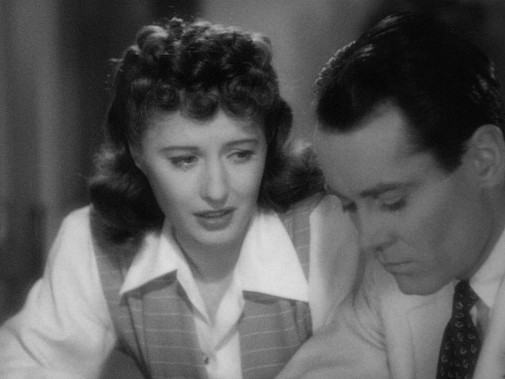
It starts subtly enough, a dissonant note echoing in a rhapsody of well-worn cynicism. The prattle never stops, words fired a mile a minute, though there's a quiver of sentimentality ringing in there somewhere. Always two steps ahead of her opponent, be it her father or lover, Jean is heartbroken when the Pike heir slips away. It hurts to see her so vulnerable, tears falling down, words of hatred masking real pain. Still, she doesn't deal with it like some meek melodrama leading lady. Instead, the con woman is an echo of tomorrow, announcing the femme fatales in Stanwyck's noir future with vindictive fervor.
"I need him like the axe needs the turkey" – has there ever been a more bloodthirsty line reading in Hollywood history?
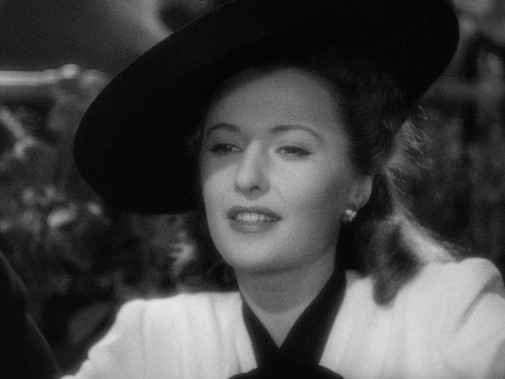
Comfortable in her deviousness, self-aware of the cruel twist to her desire, Stanwyck plays Jean's second-act ruse with mad abandon, propelling Sturges' madcap scenario into the stratosphere. Scorned scornful, she re-encounters Charles under a new identity: the sophisticated Lady Eve Sidwich. Mellowing the high-speed delivery with the deliberate fakeness of a phony English accent, Stanwyck makes the new persona into something halfway between hard to believe and totally ludicrous. And yet, you can't help but accept that Charles is fooled. Moreover, it adds to the fun that his psychological torture stems from an illusion so flimsy as to be transparent.
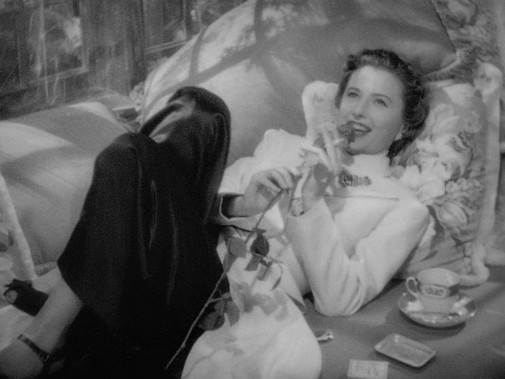
The Lady Eve's twisting plot takes such wild twists in its back half, it's hard to keep up with a basic plot description. Let's say that Jean fashions a trap out of the aristocratic persona, convincing Charles to marry her and then shock him silly with stories of a storied past. Whatever Stanwykc's level of amusement with the role might have been, Jean herself is having the time of her life watching the newlywed's humiliation. Her prideful joy is like a secret she confides the viewer. Thus we, the audience, are no longer merely besotted by Jean. We’re her accomplices. The alchemy of the trick is delicate, balancing a stolen laugh with nonchalant revelations, calculations polished by hollow regret.
Always in control, Jean/Eve/Whoever is a master strategist with an eye on the long con. Against all odds, she secures herself a happy ending. Barbara Stanwyck is also a master, knocking the complicated part out of the park, imbuing it with depth and vividness. This timeless appeal shall live on forever, never growing old or any less hilarious.
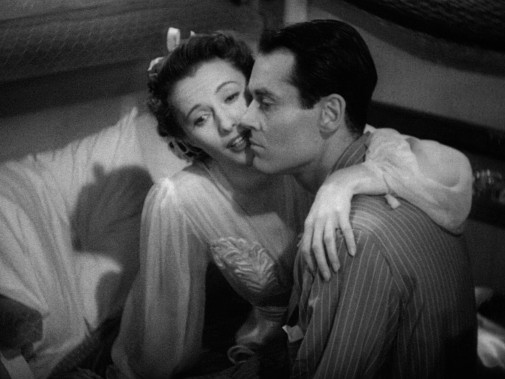
In the early 40s, there weren't many precursors to speak of, so it's harder to ascertain who might have been close to an elusive Oscar nod. However, we can see that AMPAS felt generous towards Stanwyck and appreciated The Lady Eve. While the film nabbed an Original Story nod, Stanwyck crashed the Best Actress party with another raucous comedy – Ball of Fire. Weighting these factors with a slew of sparkling reviews, it's fair to say that, were it not for Howard Hawks' Snow White-inspired lark, Stanwyck's card shark would have kept her place in the Oscar lineup.
That year, AMPAS nominated Bette Davis in The Little Foxes, Joan Fontaine in Suspicion, Greer Garson in Blossoms in the Dust, and Olivia de Havilland in Hold Back the Dawn. The Hitchcock blonde took home the trophy, partly thanks to accumulated goodwill stemming from the previous season's Best Picture-winning Rebecca. Nowadays, Fontaine is usually counted among the least deserving Best Actress victors, further elevating Stanwyck to the status of a robbed queen.
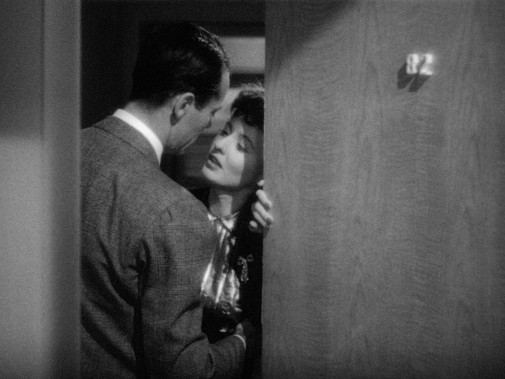
The Lady Eve is streaming on the Criterion Channel, DirecTV, and TCM. You can also rent or buy it on a variety of platforms.




Reader Comments (10)
Thank you so much for the best post. If you are looking for the celebrity weight loss or celebrity net worth. You must check the best app Ullu Mod Apk
Great read. l love that this column is addressing performances from old Hollywood.
Stanywck should have won simply on the merit of the year she had. She was also in Meet John Doe (not a movie I like much, but which she is great in) and the very charming You Belong to Me. Between her performance in The Lady Eve and Rosalind Russell's work in His Girl Friday, you have back to back pinnacles in comedic performance overlooked.
As for 1941, Fontaine is IMO so self evidently the weakest of that lineup and one of the all time worst wins. It's like all of her weaknesses and none of the strengths she brought to Rebecca are on full display. I so soured on her based on Suspicion that it took me a while to come to appreciate her in other things.
The line-up itself is pretty mediorce, even if no one aside from Fontaine is bad. I respect the hell out of Davis' performance, but am inclined to agree with William Wyler regarding her interpetation of the role. It's a shame Mary Astor couldn't get in there for the Maltese Falcon.
OMG I love this performance. In My book Barbara Stanwyck would have an Oscar for each genre:
Comedy: The Lady Eve
Noir: Double Indemnity
Western: The Furies (her best performance ever)
Melodrama: Stella Dallas
You can an additional nomination for each of these genres
Comedy: Ball of Fire
Noir: The Strange Love of Martha Ivers
Western: Forty Guns
Melodrama: There's Always Tomorrow
Claudio and @cal roth - I love you almost as much as I love Barbara Stanwyck.
Suspicion is NOT a good film; weak performance from Cary Grant too.
Stanwyck is fantastic in The lady Eve, but as she was a nominee for Ball of fire, it wasn't a terrible snub.
My favorite of the actual nominees is Davis. I like Suspicion, Fontaine and Grant are good enough. Garson is the weakest.
For me the real snub was Vivien Leigh (That Hamilton woman).
Love this performance, even though the plot really strains credulity.
I always think Joan Fontaine won her Oscar for Rebecca. She was better in that one, it's true.
This is such a great performance! I don't think it's so much of a snub since she got in for a movie that was just as, if not more, popular.
I think it would have been great for her to win a competitive Oscar, and I think she's the type of actress that could have easily had more nominations. I've always thought that she was hurt, when it came to nominations and wins, by the fact that she didn't have a contract with a studio. There was no real incentive for them to put up a strong campaign for her.
She's in a great lineup here, though I confess I haven't seen Hold Back the Dawn, something I really need to do. Davis and Garson are very formidable in their films, and either would be a better winner than Fontaine, who I generally love. Stanwyck sadly never won from four nominations, but she's in great company with the wonderful Marsha Mason, who unfortunately also went 4 and 0.
As a Barbara Stanwych STAN, I totally agreed tt she gives the best actress performance in 1941 for The Lady Eve (Bonus points: Ball of Fire & Meet John Doe).
Yes its a shame tt she never won a competitive Oscar, but she would almost certainly have won one IF she had gotten the two roles she badly wanted: Mildred Pierce which won Miss Crawford her Oscar; and On Golden Pond which cemented Miss K Hepburn iconic status as the only 4-time Best Actress winner.
The last one wld have reunite her w her old leading man, Henry Fonda, no less. Alas, Co-producer, Jane Fonda wanted K Hepburn instead.
Its true tt Stanwych elevated all the films and TV shows she starred in, even those mediocre ones. Beside her 4 noms, she shld've been nom for The Miracle Woman in 1931 (unfairly overlooked) and Baby Face or Bitter Tea of General Yen in 1933 (too risque for the former and too controversal for the latter).
Sorry, Joan & Ingrid, but Stanwaych shld've won in 1941 & 1944. Fontaine shld've won for Rebecca the yr before & her Oscar for Suspicion is obviously a make-up win. Bergman shld've won for Notorious in 1946 (which surprising she was not even nom) which is far superior than her meek, mousy turn in Gaslight.